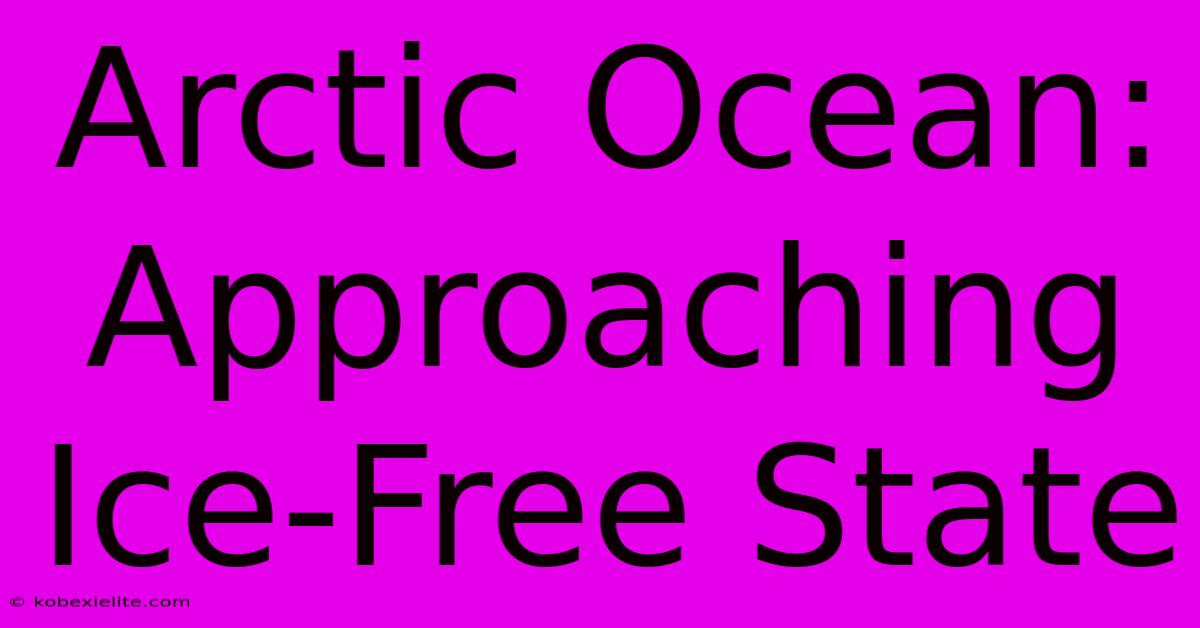Arctic Ocean: Approaching Ice-Free State

Discover more detailed and exciting information on our website. Click the link below to start your adventure: Visit Best Website mr.cleine.com. Don't miss out!
Table of Contents
Arctic Ocean: Approaching an Ice-Free State – A Climate Change Crisis
The Arctic Ocean, a vast and frigid expanse at the top of the world, is undergoing a dramatic transformation. Decades of climate change are accelerating the melting of Arctic sea ice at an alarming rate, bringing us closer to a potentially catastrophic ice-free state. This isn't just an environmental concern; it has far-reaching implications for global weather patterns, ecosystems, and geopolitical stability.
The Rapid Decline of Arctic Sea Ice
The Arctic's sea ice extent, the area covered by ice, has been shrinking consistently since satellite observations began in the 1970s. This decline is significantly faster than predicted by even the most pessimistic climate models. Summer sea ice minimums are particularly concerning, reaching record lows in recent years. While some natural variability exists, the overwhelming scientific consensus points to anthropogenic (human-caused) climate change as the primary driver.
Factors Contributing to Ice Melt:
- Greenhouse Gas Emissions: The burning of fossil fuels releases greenhouse gases, trapping heat in the atmosphere and leading to a warming planet. The Arctic is warming at a rate twice as fast as the global average, a phenomenon known as Arctic amplification.
- Positive Feedback Loops: Melting ice exposes darker ocean water, which absorbs more solar radiation than reflective ice, further accelerating melting. This is a classic example of a positive feedback loop, where a change amplifies itself.
- Black Carbon Deposition: Soot particles from industrial emissions and wildfires settle on the ice, reducing its reflectivity and speeding up melting.
Impacts of an Ice-Free Arctic
The consequences of an ice-free Arctic Ocean are profound and multifaceted:
1. Disrupted Weather Patterns:
A melting Arctic is disrupting established atmospheric and oceanic circulation patterns. This can lead to more extreme weather events globally, including more frequent and intense heatwaves, droughts, floods, and storms. The jet stream, a high-altitude wind current that influences weather systems, is becoming more unstable, potentially leading to unpredictable weather shifts.
2. Rising Sea Levels:
While melting sea ice itself doesn't directly contribute to sea-level rise (as it's already floating), the melting of land-based ice in Greenland and Antarctica, accelerated by warming temperatures, significantly increases global sea levels. This poses a major threat to coastal communities and infrastructure worldwide.
3. Ecosystem Collapse:
The Arctic Ocean is a unique and fragile ecosystem. Melting ice threatens countless species, including polar bears, seals, walruses, and various bird species that rely on sea ice for hunting, breeding, and resting. Changes in water temperature and salinity also impact marine life, potentially leading to ecosystem collapse.
4. Geopolitical Implications:
As the Arctic Ocean becomes more accessible due to melting ice, competition for resources (oil, gas, minerals, and fishing grounds) will intensify. This raises concerns about potential conflicts and the need for international cooperation to manage the Arctic sustainably. New shipping routes opening up through the Arctic also present both economic opportunities and environmental challenges.
Mitigation and Adaptation Strategies
Addressing the impending ice-free Arctic requires a two-pronged approach:
Mitigation: This involves reducing greenhouse gas emissions through transitioning to renewable energy sources, improving energy efficiency, and adopting sustainable practices. International agreements and policies are crucial for effective global action.
Adaptation: This focuses on preparing for the unavoidable impacts of climate change. This includes developing strategies to protect coastal communities from sea-level rise, managing fisheries sustainably, and conserving Arctic ecosystems.
The race against time to save the Arctic is on. Urgent and concerted global action is essential to mitigate further ice loss and adapt to the unavoidable changes already underway. Failure to act decisively will have devastating consequences for the planet and future generations.

Thank you for visiting our website wich cover about Arctic Ocean: Approaching Ice-Free State. We hope the information provided has been useful to you. Feel free to contact us if you have any questions or need further assistance. See you next time and dont miss to bookmark.
Featured Posts
-
Nissan Finance Incentives
Dec 15, 2024
-
Snap Finance Settlement Payout Date
Dec 15, 2024
-
Senators Penguins Gameday Breakdown
Dec 15, 2024
-
Cenat I Show Speed Request Musks Space Streaming Help
Dec 15, 2024
-
Watch Forest V Villa Tv Channel Guide
Dec 15, 2024
